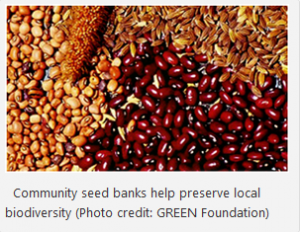 For fifteen years, Muniyamma, a farmer in Karnataka, India, practiced agriculture with the help of agro-chemicals, such as chemical fertilizers and pesticides, but in recent years she noticed a drastic decrease in yield.
For fifteen years, Muniyamma, a farmer in Karnataka, India, practiced agriculture with the help of agro-chemicals, such as chemical fertilizers and pesticides, but in recent years she noticed a drastic decrease in yield.
After attending a village meeting conducted by theGREEN Foundation about organic farming, she decided to try their environmentally friendly techniques to grow bananas. When it was harvest time, Muniyamma’s plot was healthy and green, while her neighbor’s banana plot, which still relied on agro-chemicals, showed stunted growth, pale leaves, and thinner stems. That was enough to convince Muniyamma of the benefits of organic farming.
The GREEN Foundation works to preserve natural ecosystems and sustain rural livelihoods by teaching farmers the importance of agricultural biodiversity. Through village meetings, the foundation informs farmers about organic practices, such as creating fertilizer from organic waste, that are better for the environment and result in higher yields, at a lower cost, for farmers.
To protect the local biodiversity and preserve traditional seeds, the GREEN Foundation, in partnership with other NGOs, including the Seed Saver’s Network and The Development Fund, has created community seeds banks throughout the state of Karnataka, India. All villagers can become a member of a community seed bank by paying an annual nominal fee. Members, who receive seeds free of cost, sow the seeds, harvest the crop and return double the amount of seeds to the bank. To maintain purity of the seeds, farmers must follow rules – such as no chemical fertilizers and pesticides – when growing their crops.
Because these seed banks are managed by self-help groups (SHG) made up of women, they also act as a means of empowering women farmers through leadership roles. It is their responsibility to ensure that the seeds are stored properly, the records are maintained, and quality seeds are selected from those returned.
To maintain the diversity of the seeds stored in the community banks, the GREEN Foundation assists in the creation of community gardens. While all members of the community seed bank are responsible for maintaining the community garden, landless women farmers are especially encouraged to produce indigenous vegetable seeds, helping them earn additional income. The foundation provides farmers with technical guidance for inputs, including creating fertilizer from unwanted materials like dried leaves, mud and cow dung through the process of vermicomposting. This method, that uses worms to make the compost, ensures high quality by storing the unwanted waste materials in cement tanks for 45 to 60 days.
In addition to popular varieties of crops, individuals are also encouraged to grow rare crops, such as red beans and chilies, to add to the diversity of the seed bank. Farmers use a small plot of their land to grow these traditional, but unfortunately disappearing varieties of vegetables, and can either sell their harvest to other farmers for additional income as well as contribute to the seed bank.
Through organic practices and the preservation of local crops, the GREEN Foundation is helping communities in rural India improve their livelihoods and help protect the environment.
Guest Post by Supriya Kumar

Danielle Nierenberg, an expert on livestock and sustainability, currently serves as Project Director of State of World 2011 for the Worldwatch Institute, a Washington, DC-based environmental think tank. Her knowledge of factory farming and its global spread and sustainable agriculture has been cited widely in the New York Times Magazine, the International Herald Tribune, the Washington Post, and
other publications.
Danielle worked for two years as a Peace Corps volunteer in the Dominican Republic. She is currently traveling across Africa looking at innovations that are working to alleviate hunger and poverty and blogging everyday at Worldwatch Institute’s Nourishing the Planet. She has a regular column with the Mail & Guardian, the Kansas City Star, and the Huffington Post and her writing was been featured in newspapers across Africa including the Cape Town Argus, the Zambia Daily Mail, Coast Week (Kenya), and other African publications. She holds an M.S. in agriculture, food, and environment from Tufts University and a B.A. in environmental policy from Monmouth College.








